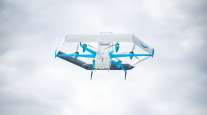Drone Tech Firm Cites Security in Cutting Ties With China’s Top Manufacturer

[Stay on top of transportation news: Get TTNews in your inbox.]
A supplier of drone technology to dozens of state and local law enforcement and public safety agencies, located in the United States and a handful of other countries, will stop working with Chinese drone manufacturers, citing security concerns.
Cape Productions Inc., a Redwood City, Calif.,-based startup, plans to inform customers July 17 that it will stop selling software compatible with Chinese drones to its clients, most of whom use the tools to remotely dispatch and operate the small aerial vehicles to surveil possible incidents or crime scenes. It’s a blow to China’s DJI, the world’s top maker of drones that has spent years trying to calm fears that its products could be used for espionage.
The ban is the latest illustration of how technology companies are in the crossfire of the deteriorating relationship between the United States and China. American companies relying on global supply chains have seen their costs increase, while Chinese technology companies are increasingly viewed with suspicion in the United States.
DJI’s situation has echoes of Huawei Technologies Co., the Chinese telecommunications equipment company that the Trump administration has targeted as a national security threat for months, using these concerns to restrict its access to the U.S. market. DJI’s domination of U.S. drone sales has long raised its own suspicions. The U.S. Army expressed cybersecurity concerns with its drones in 2017, and Homeland Security issued an alert last month saying it was worried about sensitive video footage being sent to China.
“The statements from different federal agencies have caused partners and prospective customers to have concerns,” Cape CEO Chris Rittler said. “That’s real.”
But in blacklisting Chinese drones, Cape runs the risk of hampering its own business, at least in the short term. DJI currently accounts for every single drone that runs Cape’s software commercially. The company declined to specify how many that is, saying only that it has flown more than 150,000 trips.
Cape will begin asking new customers to choose from a list of approved manufacturers that, for now, has only one name on it: Skydio Inc. The startup is located a mile from Cape’s headquarters in Silicon Valley and recently began working with the Defense Department. Cape will allow existing clients to use their DJI drones until the end of their contracts, which last no longer than a year.
In a letter DJI sent to a Senate subcommittee last month, the company denied charges that it sends video footage abroad and said it has built custom drones without internet capabilities for use in government projects. It blamed criticism on a desire to squelch competition from China.
This month, the Interior Department published its analysis of DJI’s drones designed for government use. The agency recommended approving DJI’s products but suggested limiting their use to nonsensitive missions involving data that could safely be made public. One reason the department cited for approving DJI was the lack of any viable domestic alternatives.
Government officials and American investors have long pined for a competitive drone industry in the United States, but China has established a stranglehold. “The market pressures have declared them the winner,” said Jim Williams, a former official at the Federal Aviation Administration who is a consultant for clients using drones. “They’ve got the technology, they’ve got the low-cost manufacturing, and they continue to innovate. It’s going to be awhile before anyone can challenge them.”
Rittler declined to identify which customers voiced concerns about Chinese equipment. He said Cape began preparations to break ties with DJI a year and a half ago, when he joined the company and sought to pursue more government customers. Increased geopolitical conflict between the United States and China over the past several months, he said, was not a major factor in the decision. “Tension has been underground, or behind the curtain,” Rittler said. “You’re hearing more and more of it come to the forefront.”




